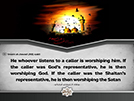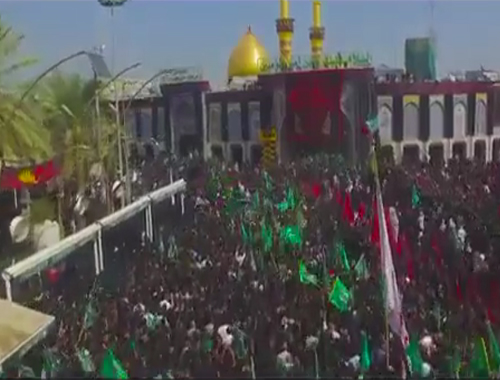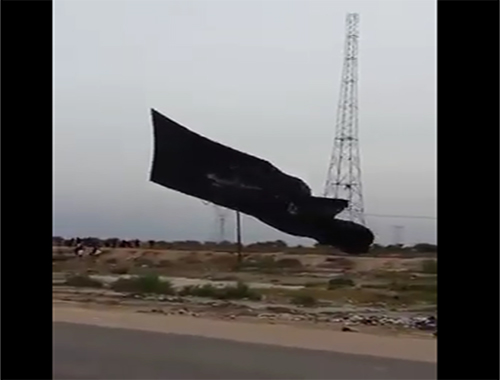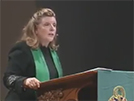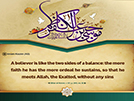Verse1-4
- Details
- Hits: 2496
Sura 'Al-i-'Imran
No. 3
Section 1
The Qur'an and the previous scriptures - the correct knowledge of the verses of the Qur'an - Misinterpretation of the figurative verses - Prayer for guidance from Allah
بِسْمِ اللّهِ الرَّحْمَنِ الرَّحِيمِ
(1) الم
(2) اللّهُ لَا إِلَهَ إِلاَّ هُوَ الْحَيُّ الْقَيُّومُ
(3) نَزَّلَ عَلَيْكَ الْكِتَابَ بِالْحَقِّ مُصَدِّقاً لِّمَا بَيْنَ يَدَيْهِ وَأَنزَلَ التَّوْرَاةَ وَالإِنجِيل
(4) مِن قَبْلُ هُدًى لِّلنَّاسِ وَأَنزَلَ الْفُرْقَانَ إِنَّ الَّذِينَ كَفَرُواْ بِآيَاتِ اللّهِ لَهُمْ عَذَابٌ شَدِيدٌ وَاللّهُ عَزِيزٌ ذُو انتِقَامٍ
In the Name of Allah,the Beneficent,the Merciful
1. " 'Alif 'A', Lam 'L', Mim 'M'."
2. " Allah, there is no god but He, the Ever-Living, the Self-Subsisting (the Sustainer of all things)."
3. " He has sent down to you the Book with truth, confirming that which is before it, and He sent down the Turah and the Evangel."
4. " Aforetime, a guidance for people, and He sent down the Furqan. Verily those who disbelieve in the Signs of Allah, for them there is a severe chastisement and Allah is Mighty, the Lord of Retribution. "
A Note:
As was mentioned at the beginning of the commentary of Sura Al-Baqarah, Alif 'A', Lam 'L', Mim 'M' are known as abbreviated letters, the Muqatta'at. The best and well known definition about them is to say that they are secrets between Allah and His Messenger. Or, this subject may be referred to by saying that the Quran has been composed of these very abbreviated letters.
In other words, Allah has sent down the Quran through letters. This itself is a miracle, the same as He creates Man from soil, while man makes potsherd, brick, earthenware etc. from it. This is the difference of the Divine Power and human power.
It is worthy to note that the above abbreviated letters have occurred at the beginning of six Suras in the Quran: Al-Baqarah, 'Al-i-'Imran, Al-'Ankabut, Ar-Rum, Luqman, and As-Sajdah. And the abbreviated letters Alif 'A', Lam 'L', Ra 'R' have also occurred at the beginning of Suras: Yunus, Hud, Yusuf, Ar-Ra'd, Ibrahim, and Al-Hijr. Again the abbreviated letters Ha 'H', Mim 'M', have occurred at the beginning of Suras: Ash-Shaura, Fussilat, Az-Zukhruf, Ad-Dukhan, Al-Jathiyah, and Al-'Ahqaf. As the evidences show in the above, every one of these instances of abbreviated letters has been revealed at the beginning of six suras, while in each of other instances the abbreviated letter(s) has been stated for only one sura.
* * * *
Commentary:
In creation, Allah has complete cognizant administration and domination upon the whole creation. The material factors and appliances can be causes of creation but they are not alive when the cause of their existence is not from their own. The material instances have not any independent knowledge, life, and power. It is only He, the Ever-Living, that the life of every living creature depends on Him.
" Allah, there is no god but He, The Ever-Living, the Self-Subsisting (the Sustainer of all things)."
It is cited in Jaushan-Kabir, the Supplication: He has been alive from before any living thing, and will be alive after any living thing. There is no living thing as His partner. He is in need of none. He is the Alive Who has no death, but the life of any living creature, as well as his sustenance, is in His control. He is a living Essence Who has not got it heritably from another living being.
Now, here is a close translation for the exact text of the supplication:
" O' Ever-Living, preceding every living being, "
" O' Ever-Living, succeeding every living being, "
" O' Ever-Living, like unto Whom there is none, "
" O' Ever-Living, Who has no living partner, "
" O' Ever-Living, Who is not dependant on any living being,"
" O' Ever-Living, Who causes every living being to die, "
" O' Ever-Living, Who provides sustenance to every living being, "
" O' Ever-Living, Who has not inherited life from any living being, " (1)
* * * *
1. The qualification of a god to be worshipped is having nominal perfections such as being Ever-Living and Self-Subsistent.
2. Monotheism is at the top and is the framework of all Divine Books.
The term Torah is a Hebrew word which means: 'law, the whole body of Jewish religious literature, including the Scripture. The Torah contains five chapters, entitled: Genesis, Exodus, Leviticus, Numbers, Deuteronomy. Since the event of the death of Moses (a.s.) and the explanation of his burial are mentioned in the Torah, the Judgement is that these subjects of the Torah have been added after the time of Moses (a.s).
The term Evangel has a Latin root (evangelium) which means 'good news', or 'the teaching of the New Testament'.(2) The Evangel is the Divine Book of the Christians and wherever in the Qur'an it is mentioned it is stated in the singular form while, today, there are different Books amongst the Christians by this name, four of which are very famous. They are as follows:
1. Matthew is one of the four Evangelists, the first book of the New Testament, and the reputed author of the first Gospel. Matthew is one of the twelve students of Jesus (a.s.).
2. Mark, the second book of the New-Testament, telling the story of Jesus' life. Mark wrote this book under the authority of Petros after the time of Jesus (a.s.).
3. Luke, a physician and companion of the apostle Paul and the reputed author of the third Gospel.
4. John the fourth Gospel, the book of revelation. He has also been one of Jesus' students.
It is also remarked that the abovementioned Gospels have all been written wholly after Jesus (a.s.).
Explanations:
1. The heavenly Books of prophets, one after another, are complementary of the formers:
"... conforming that which is before it,..."
2. The confirmation of the former heavenly Books and prophets is a factor to the unity of theists and one of the manners of inviting others as the verse says: " conforming ".
3. The confirmation of the Qur'an upon the Torah and Evangel is a proof for the idea that the former Books are heavenly, and, also, it is a great right upon the former divine religions. Otherwise, regarding the superstitions that have been added to the Torah and the Evangel, their being heavenly would be forgotten totally.
4. The means, instructions and the stages of training are different in the former Books due to their time and conditions of revelations. Yet they are on the same line of development and unity towards the godly goal.
5. The revelation of the Qur'an unto the Prophet (p.b.u.h.) is an honour from Allah unto his personality when He preceded the phrase 'to you' to the term 'the Book':
" He has sent down to you the Book with truth,..."
6. The Qur'an is secured from any falsehood, and it is coinciding to reality and truth.
7. In spite of the fact that the Torah and the Evangel were separately and wholly revealed at once, the Quran was sent down gradually during twenty three years. This is in the condition that it was revealed to the heart of the Prophet (p.b.u.h.) at once by the Grand Night.
8. Considering the qualities mentioned in the previous verse, the revelation of the heavenly Books is a manifestation of the attributes of Allah.
The first part of this verse, added to the meaning of the previous verse, addresses the Prophet of Islam (p.b.u.h.) and totally says:
" He has sent down to you the Book with truth, confirming that which is before it, and He sent down the Turah and the Evangel." " Aforetime, a guidance for people, ..."
Then, pointing to the Qur'an which separates right and wrong, it follows saying:
"... and He sent down the Furqan. ..."
Hence, after the verses of the Qur'an being sent down from the side of Allah and completing the argument being done, together with testification of innate disposition and intellect to the truthfulness of prophets in their invitations, there is not any other way against rejectors but punishment. That is why, in this verse, next to the statement about the rightfulness of the Prophet (p.b.u.h.) and the Qur'an, it says:
"...Verily those who disbelieve in the Signs of Allah, for them there is a severe chastisement ..."
And, to make it clear that there is no doubt about the capability of Allah in accomplishing His threats, it says:
"... and Allah is Mighty, the Lord of Retribution."
(1) Jaushan-Kabir Supplication, Item 70
(2) Webster's New World Dictionary, Third College Edition.


